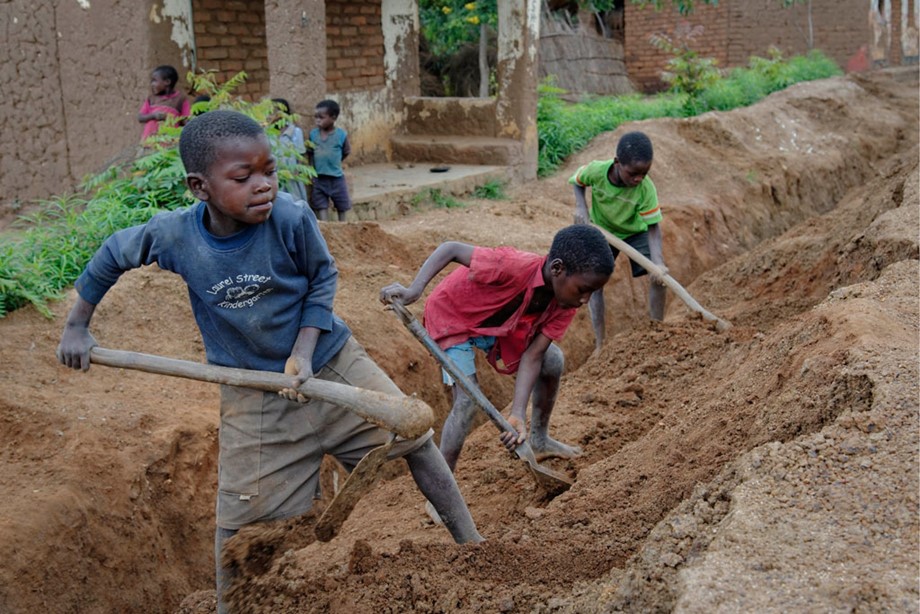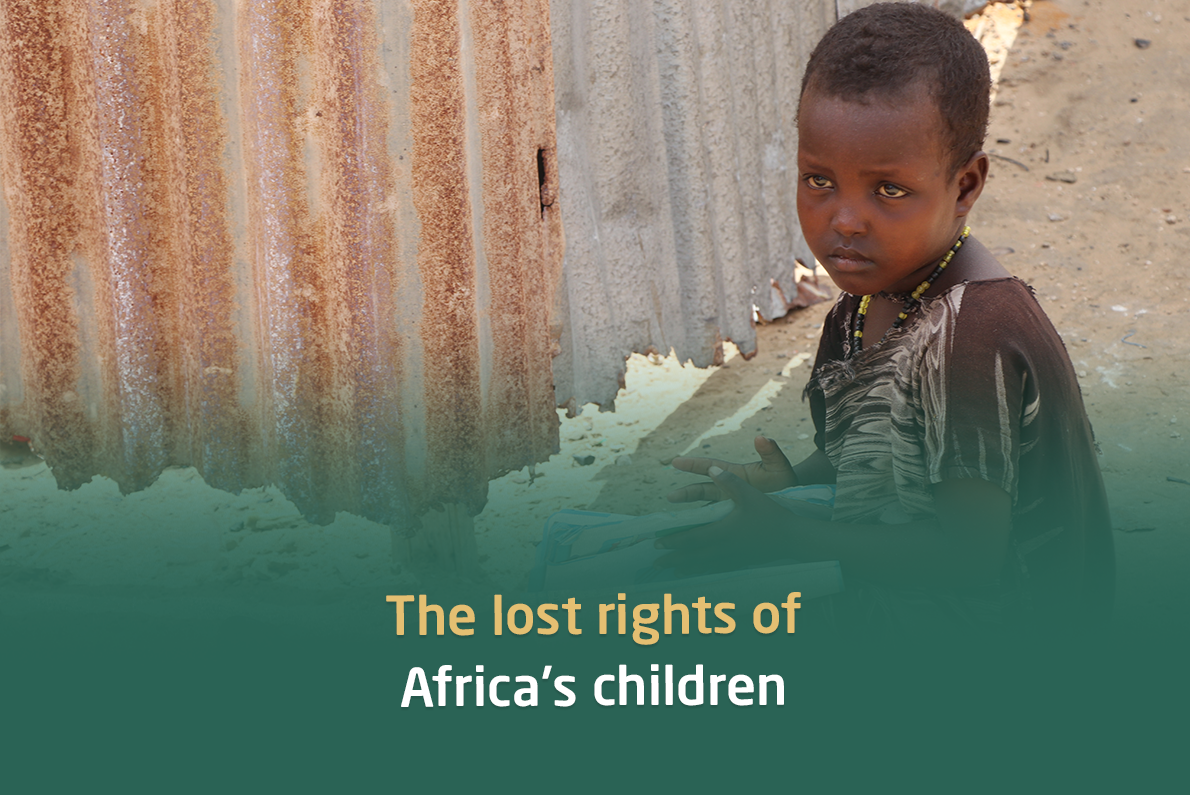The lost rights of Africa’s children
Children’s rights represent one of the fundamental humanitarian issues that require widespread attention and international efforts to preserve and promote them around the world, but Africa remains of particular interest due to the unique challenges that the continent faces in this context. The rights of children in Africa is a sensitive and complex topic that requires a thorough discussion to identify the challenges and the efforts being made to overcome them.
Challenges to children’s rights in Africa
The rights of children in Africa suffer from several fundamental challenges that negatively affect their lives and future. Among these challenges are:
Poverty and social marginalization:
Poverty and social marginalization are among the most prominent factors that negatively affect the rights of children in Africa. Many poor families rely on their children’s income as the main source to meet daily life needs such as food and shelter. This early exposure to work exposes children to several risks:
Economic exploitation:
Children of poor families find themselves forced to work due to the stress of poverty, being exposed to work at an early age and in conditions that are often harmful to their physical and psychological health. Children work in diverse fields such as agriculture, industry, and services, where they are vulnerable to injuries and accidents in unsafe conditions, which affects their health and hinders their normal development.
Deprivation of Education:
Early work leads to the deprivation of children of their basic rights to education. Instead of attending school and gaining knowledge and skills, children spend many hours on hard work that hinders their mental and intellectual development. This delay in education negatively affects their future opportunities and is renewed by the cycle of poverty and marginalization.
Lack of access to health care:
Working children at an early age often suffer from a lack of basic health care. They are exposed to diseases and injuries without obtaining the necessary medical care, which increases the morbidity and mortality rates among them.
Lack of legal protection:
In many African countries, laws protecting children from early work are inadequate or not effectively implemented. This leaves children vulnerable to exploitation and working in unsafe conditions without legal protection guaranteeing their rights.
In addition to what has been mentioned, children in poverty face additional challenges such as social marginalization, poor nutrition, and family instability. All these factors interfere to negatively affect the lives of children and prevent them from growing and developing healthy and stable.
It is imperative to strengthen international and domestic efforts to combat poverty and improve the living conditions of poor families in Africa, including providing material and technical support, strengthening infrastructure, promoting education and universal health care for children. Through these efforts, it is possible to provide a safe and sustainable environment that contributes to the realization of children’s rights and provides a better future for future generations in Africa.

Armed conflicts and humanitarian crises:
Armed conflicts and humanitarian crises pose a major threat to children’s rights in Africa, as children are exposed to numerous risks and are significantly negatively affected in these contexts. Here are some important points about these challenges:
Homelessness and poor supervision:
Armed conflicts and humanitarian crises often lead to the displacement of families and children, exposing them to danger and extreme poverty. Homeless children become vulnerable to abuse and exploitation, as they lack the necessary protection and basic care.
Forced recruitment and use as child soldiers:
Children are an easy target for forced recruitment in armed conflicts, where they are forced to participate in hostilities or military activities. Such children are at risk of death or physical injury, as well as experiencing enormous psychological stress and the destruction of their childhood.
Denial of education and health care:
Children affected by armed conflict are often denied access to education and basic health care. Schools are closed, or inaccessible due to conflicts, which exacerbates diseases and nutritional deficiencies among children.
The need for international and local intervention:
To protect the rights of children in the face of armed conflict and humanitarian crises, international and local intervention must be strengthened to provide the necessary protection and care. This includes the provision of humanitarian assistance, ensuring children’s access to education and health care, and the rehabilitation of children psychologically and physically affected by conflicts.
The negative impacts of armed conflicts and humanitarian crises on the lives of children in Africa require immediate and effective responses from international and local groups to reduce these challenges and protect children’s rights. By strengthening security and stability, providing the necessary support to the affected families, a tangible improvement in the lives and future of children on the African continent can be achieved.
Discrimination and inequality:
Discrimination based on gender, race, and socio-economic conditions is a major barrier to children’s rights in Africa, negatively impacting their opportunities to access quality education and adequate health care. Here are some important points about this challenge:
Sexual discrimination: children in Africa face discrimination based on their gender, as girls may have fewer opportunities in education than boys, especially in village communities or poor families where children are preferred to be used for work rather than sent to schools.
Ethnic discrimination: children belonging to ethnic minorities may be discriminated against and excluded, limiting their access to education and basic health care. Access to essential services can be difficult due to rampant ethnic discrimination in some communities.
Socio-economic discrimination: poor and socially disadvantaged children face significant challenges in accessing basic services, such as education and healthcare. Poor infrastructure in poor areas is a major obstacle to the realization of children’s rights in these areas.

Lack of infrastructure and basic services:
The lack of basic infrastructure and services is a major challenge facing children in Africa, affecting their lives and rights significantly. Here are some important points about this issue:
Lack of roads: poor infrastructure and unpaved roads make access to schools and medical facilities difficult, especially in rural areas. Children sometimes have to walk long distances to get to school or a clinic, which affects their school attendance and health.
Lack of schools: some communities in Africa may lack a sufficient number of schools, disrupting children’s educational opportunities. In some cases, children may have to travel to other areas to get to schools, which increases the complexity of access and may lead to their interruption from education.
Efforts to protect children’s rights in Africa
The protection of children’s rights in Africa is a necessary and ongoing matter that requires integrated efforts from governments, international organizations, and local communities. Here are some of the efforts being adopted to promote children’s rights on the continent:
Strengthening laws and policies
These efforts include updating laws and policies to protect children’s rights, such as tightening control over child labor and preventing discrimination against them. Many countries in Africa are strengthening legislation to establish permissible working ages, applying sanctions to those who violate children’s rights.
Education and outreach
Implementing educational and awareness-raising programs that contribute to raising awareness of children’s rights and the importance of protecting them. Improving the quality of education and increasing access to it enhance children’s opportunities for personal and professional development, reduce the likelihood of their employment at work.
Sustainable development
Investing in sustainable economic development contributes to improving the living conditions of poor families, reducing their dependence on children’s income as a source of income. Providing employment opportunities for adults and providing support to families enhances the stability of families and preserves the rights of children.
Local and international partnerships
Building strong partnerships with local governments, international organizations and local communities enhances the implementation of programs and projects aimed at protecting children’s rights. These partnerships help in sharing knowledge and experiences, pooling resources to meet the great challenges facing children in Africa.
Despite the great challenges that Africa faces in ensuring the rights of children, the efforts made indicate tangible progress. By strengthening laws and policies, improving infrastructure, and providing education and healthcare, a safe and sustainable environment can be provided for children in Africa. Investing in the promotion of children’s rights is not only ethical, but also contributes to the promotion of sustainable economic and social development of the entire region.
The role of AHAD in improving the quality of life of the poor in Africa
AHAD plays a vital role in improving the quality of life of the poor and disadvantaged in Africa, especially in the countries of the central and western continent. AHAD is characterized by a set of initiatives and projects targeting various aspects of life for vulnerable communities, seeking to achieve a sustainable positive impact on their lives. Here are some points that characterize the role of AHAD and the importance of its activities::
AHAD provides significant support in the field of health by establishing health facilities and providing basic medical services to poor communities. These services include necessary medical treatments, vaccines, and emergency health assistance, which contributes to improving the health of individuals and increasing survival rates.
AHAD seeks to promote educational awareness and improve the quality of education in the communities it serves. The association establishes schools and educational centers, provides educational resources for children, organizes training courses for adults with the aim of improving their skills and increasing their opportunities in the labor market.
Many poor regions of Africa suffer from a lack of access to clean water and sanitation services. Through its projects, AHAD seeks to provide clean and safe water supply, establish sanitation infrastructure, which enhances living conditions and protects the population from waterborne diseases.
AHAD promotes the economic sustainability of communities by supporting agriculture and microenterprises, helping to provide jobs and increase income for poor families. The association trains local residents in sustainable farming techniques and project management, to stimulate economic growth in the region.
You can visit the AHAD website to find out more about the projects it offers
ALSO READ
WHAT THE FOOD BASKET CONTAINS IN AHAD
Join us in our message




